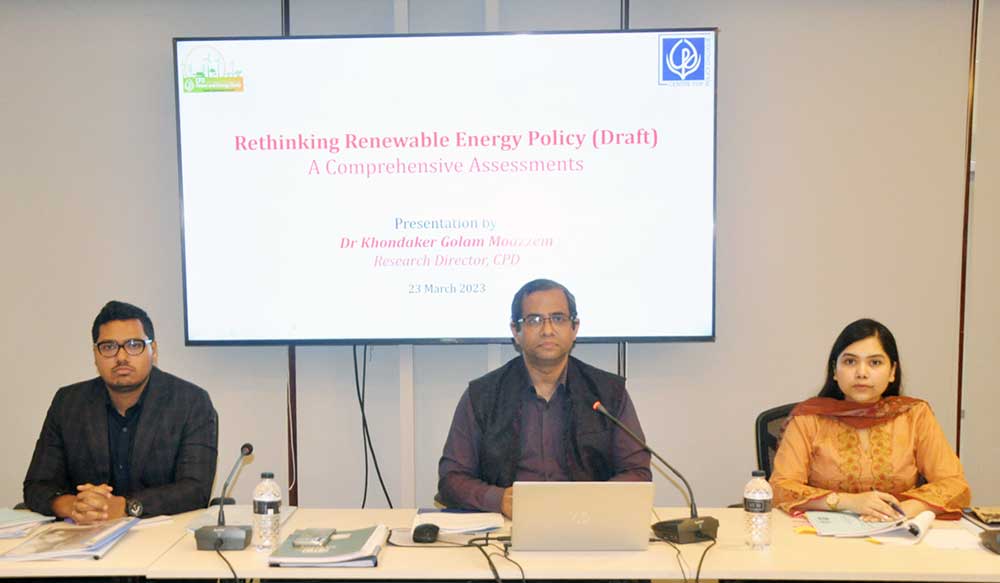
Recently, the Sustainable and Renewable Energy Development Authority (SREDA) under the Power Division of Ministry of Power, Energy, and Mineral Resources (MoPEMR) has initiated to revise the Renewable Energy (RE) Policy 2008.As a result, a policy report has been developed titled ‘Renewable Energy Policy (Draft) of Bangladesh 2022’. The vision of the draft policy is to develop an efficient, sustainable, secure, affordable, competitive and environment friendly power system while developing manufacturing capabilities and creating the country as a preferred investment destination of RE sector. The mandate is to increase the share of RE in the total energy demand of the country. Although the new draft of RE Policy 2022 is more detailed compared to the RE Policy 2008, it needs major revision in order to meet the goals and targets of clean energy. The Centre for Policy Dialogue (CPD) proposed that a new RE Policy is needed instead of revision of the RE Policy 2008.This has been highlighted in CPD’s presentation on “Rethinking Renewable Energy Draft Policy 2022: A Comparative Assessment”.
In this context, CPD organised a media briefing titled “New Renewable Energy Policy 2022 (Draft): Will it be able to meet the Clean Energy goal? on Thursday, 23 March 2023. The study has been conducted by Dr Khondaker Golam Moazzem, Research Director of CPD and Mr Mashfiq Ahasan Hridoy, Research Associate, CPD.
In his keynote presentation, Dr Khondaker Golam Moazzem, said “The shift in the vision of the policy draft is positive. The vision is now clearer since it promotes environment-friendly initiatives. However, the Green House Gas (GHG) emission related issues has not been accommodated”. The objectives of the policy cover the desire to maintain global standards and practices. Integrating and mentioning more recent solar technologies in the revised draft is appreciated. However, mentioning only the potential options is not enough. How these potential resources can be tapped-in to utilise the maximum output should have been indicated.
It is clear that the policies are not aligned with RE related targets. There are major differences between RE related policies in terms of reduction of fossil fuel, use of efficient subsidy codes, energy audit, tax exemption, modernisation of technologies, upgradation of grid, supporting Electronic Vehicles (EVs) and reduction of Green House Gases (GHG) etc. The RE policy is formulated on complying with the International Climate Agreement goals whereas the SREDA Act is not focused on this particular factor. RE Policy prioritises regular hydrogen energy but Mujib Climate Prosperity Plan (MCPP) prioritises the production of Green hydrogen through electrolysis powered by wind energy.
When the policy draft was compared to the National Energy Policy of India and Renewable Energy Policy of Vietnam, it was observed that, in terms of GHG emissions, the new draft had no fixed goals. The new draft has assumed RE targets whereas the Indian and Vietnamese policies have set targets. The auction guidelines in the other two policies are currently in practice whereas in the new draft it has been mentioned but not implemented yet. The Request for Quotation (RFQ) and Request for Proposal (RFP) only exists theoretically in the new draft but they are in full practice in Vietnam and India.
The Research Director recommended introducing a carbon cap for major carbon-emitting the industries and eventually shift to carbon tax. Competitive bidding for RE projects, procurement of power and feed-in-tariff scheme can also be introduced. The government institutions should especially prioritise solar Photovoltaic (PV) projects. The net metering policy should properly be implemented.
An open-floor Q&A session with journalists from both print and electronic media followed the discussion. The study team said that phasing out the use of fossil fuels will not have adverse impacts on the economy but it might save the economy from contraction since it will reduce the fiscal pressure of the government. The use of fossil fuels should be discouraged, otherwise, it will be difficult to shift to renewable energy for electricity generation.



